- Home
- A. C. Crispin
Pirates of the Caribbean: The Price of Freedom Page 2
Pirates of the Caribbean: The Price of Freedom Read online
Page 2
Queen Tiyy’s eyes filled with tears, but she did not allow them to fall. Taharka saw her blink them back, and his heart tightened in his breast. “What then?” she asked.
“I heard a sound from the cliff to my right. When I turned my head, a great golden lion came bounding down the sheer face of the stone. It was much larger than any lion I had ever seen. His mane gleamed like the sun, making a nimbus of light around his face. He leaped down from the cliff and stood before me. The horses plunged in their traces with terror. But then the lion spoke, and they fell quiet, and stood as still as the statues in the temples.”
“The lion…spoke?” Her voice trembled.
“Yes. His voice was the crashing of the surf in a storm, the rumble of thunder, and the sound the earth makes when it shakes…all those sounds together. It was when I heard that voice that I knew this was no ordinary lion, but Apedemak himself. His words echo still in my mind: ‘Look to the sea, Taharka. You must cross the great ocean. Only by doing so will you find the means to save what you hold dearest. It is the only way.’ And when the lion finished speaking, his mane blazed up so brightly that I could no longer look, but had to shut my eyes and turn my face away. When I opened my eyes again, I awakened to find the moonlight on my face. But I knew I had just experienced a true dream, one such as the priests describe. I knew the god had told me what I must do.”
“Cross the sea…” murmured Tiyy. When she looked up at her husband, fear shadowed her features. “Leave our island, husband? Leave your people, who need your rule, your strong hand to guide them? Go out into the world? We have been protected from outsiders for so long! Who knows what evils may be found in the outside world these days? Cannot you send General Kashta and High Priest Senkamanisken? They are strong, able men who are loyal to you. They would travel and search to the doors of death and beyond for you!”
Pharaoh Taharka shook his head. “You know I am the only one who can undertake this quest, my queen,” he said. “Surely you have not forgotten what I wear?” He held up his right arm. In the moonlight, the wide wristlet gleamed, and the gemstones glittered. Deprived of their color, they flashed like the moonlight along the wave crests. “I do not speak of it often, but recall that my bracelet is one of the Three.”
Long ago, when the two kingdoms of Egypt and Kush had been one, the sons and daughters of Kush had turned their faces from the old life to travel west, toward the setting sun, leaving behind all that they had known. They had acted because Apedemak had appeared to the son of their pharaoh and the chief priest to express his wishes that his chosen people should depart and found a new land to the west. To guide them on their journey, he had given them the Heart, and, acting on his orders, the priests had used tiny slivers from the Heart to fashion the three bracelets. Each endowed the wearer with certain powers. The one Taharka wore gave its wearer the power of navigation—of locating whatever it was that the wearer needed. The bracelet’s magic would guide him, anywhere in the world, to achieve his quest. It also granted him insight, a great gift for a man who must rule wisely.
The pharaoh’s thirteen-year-old son and heir, Prince Shabako, wore the one that would allow him to unlock any lock, any portal. Its power extended to unlocking hearts, both human and animal. He had never met a stranger, it seemed.
Taharka’s daughter, fifteen-year-old Princess Amenirdis, wore the wristlet that allowed the wearer to see through illusion, to lift the magical mists that cloaked the island of Kerma and to discern the portal to the sacred labyrinth. She could weave and unweave spells—and any thread she spun, any fabric she wove, was a joy to gaze upon. Her spell-weaving ability also gave her insight into the way words were woven together to produce language.
It took the power of all three bracelets used together to open the way into the labyrinth and the treasures it contained.
The queen raised a finger, but did not quite touch the magical wristlet. “Anyone with the Sight who saw that bracelet would know it for a thing of power,” she cautioned. “Greedy men would kill to possess it!”
“And greedy women, too, doubtless,” observed Taharka dryly. “Fear not, my queen. The wristlets have the power to conceal their true nature. Watch.” He touched the bracelet lightly with the fingers of his left hand, closed his eyes, and summoned its power. Tingling warmth enclosed his wrist. Taharka heard his wife gasp.
He opened his eyes, to see that his wristlet had changed. Now only a slim strip of woven grass encased his wrist, a bracelet such as a child might make in an afternoon for amusement. In the middle of the band of grass a small, flattened, hollowed-out pebble was threaded. The pebble was a common beach stone, smoothed by waves. Scratched into it were a few crude lines that, when studied from the correct angle, resembled the head of a lion.
“I did not know your bracelet could disguise itself,” the queen said.
“They all can,” the pharaoh replied. “Magic is an intrinsic part of them. But when we are given our lessons in using their powers by the priests, we are cautioned against lightly revealing them.” Taharka looked around at the palace, which stood on a rise, the first rank of the foothills leading to a ridge of mountains that nearly bisected the island, then down at Zerzura, gleaming white in the moonlight. “Of course here, in our own land, there is no need to invoke the power of disguise the wristlets bear. But out in the world, disguise will be necessary.”
Tiyy put a hand on her husband’s arm, just above his bracelet. “How long will it take you?” she asked anxiously. “I do not know…how long…” she trailed off, but Taharka knew what she was trying to say. Aniba had his good days, or even weeks, but his strength had been declining steadily. The prince might last two or three months, perhaps. He would not last six.
“I will be as swift as may be,” Taharka assured her. “It is early summer. The winds should be good. I will purchase passage on the fastest modern ship. Or perhaps I shall purchase a ship and crew. Once I am in the world, I will make the decisions necessary.”
He looked down at her. “Never doubt my love for you, or for our son. Rule our people well while I am gone, my queen. I will think of you, and Aniba, and Amenirdis and Shabako every day. If my thoughts were birds, my queen, the skies above Zerzura would be dark with them.”
The queen managed a wan smile. “It is a brave thing you do, my husband. You are a good father.”
Taharka bent his head and kissed her, tasting salt on her lips. She responded with such fervor that it was as if he had left and just returned, victorious. When he finally pulled back, it was only to murmur endearments and reassurances as she clung to him.
When they stepped apart, at long last, Queen Tiyy’s shoulders straightened. “Fear not for our land, my husband. I will rule our people and guard our treasure until your return. This I swear.”
The pharaoh nodded. His heart was too full for words. Together, the royal couple turned and walked back into the palace, their heads high, their strides measured and steady.
Behind them, the moonlight shone down on the harbor of the Shining City. The ocean waves gleamed and glimmered, black and silver, black and silver, until they met the shore, where they curled into fists of white froth.
CHAPTER ONE
Fair Winds and Black Ships
JACK SPARROW, FIRST MATE of the East India Trading Company merchant vessel Fair Wind, stood on the quarterdeck, glaring down at most of his hastily assembled crew. Beside him rested a large cask. It sloshed faintly as the brig glided over the topaz waters of the Caribbean Sea, three days out from Port Royal, Jamaica. Jack drummed his fingers on the top of the half-empty cask. “This rum,” he said, raising his voice so he could be heard over the creaking of the sails, the slap of the sea, and the rush of the wind, “is half gone. Why is the rum gone?”
The weatherbeaten faces that had been regarding him quizzically suddenly vanished as each crewman looked down, twisting his cap in hands scored by years of hard, dangerous work at sea. The men shuffled their feet on the holystoned planks of the Fair Wind’s weather de
ck. No one ventured a reply.
Jack hadn’t really expected any of the culprits to confess, and “peaching” on a mate was regarded as lowest of the low among the men, so the lack of a reply didn’t surprise him. He actually sympathized with the culprits. After all, the stolen substance was rum. Jack liked rum as well as any man. Well, to be truthful, better than most. But this rum was not, technically speaking, rum. It was cargo. He let his temper, until now held in check, rise.
“I will tell you why the rum is gone,” Jack roared. He thumped the top of the container. “This half-empty cask, which as of last night was full of rum bound for England, rum entrusted to this vessel to be carried in her hold until we reach our destination, rum intended to be sold to the taverns and cellars of England, to slake English thirsts, is gone because,” he paused for effect, “several members of this crew that stands before me, this same crew of misbegotten scurvy sea dogs, crept down into the hold and drank it!” He slapped his hand against the side of the cask where one of the staves had been pried out of alignment with the others, leaving a long, dark stain of spilled rum down the side of the container. Jack turned to the man standing beside him. Robby Greene was five years younger than Jack himself, which made him barely twenty. He was a slender but whipcord-strong youth, with a ready smile and a mop of golden curls that he kept tied back with a black ribbon. Greene, as second mate aboard Fair Wind, was responsible for the ship’s cargo. “Mr. Greene!” Jack said. “What, in your professional opinion, is the precise word that should be applied to the action of starting this cask and subsequently drinking half of it? Of wantonly guzzling our cargo?”
Whoever had gotten to the rum had managed to bypass the locks on the entrances leading down to the holds. They’d started the cask, siphoned off the contents, drunk their fill, then re-tied the lashings binding the cargo, no doubt hoping the damage would be attributed to the rolling of the ship. Jack had barely relieved Third Mate Edward Tomlin when Robby had appeared to show him the half-emptied cask. Devil take it, Jack had thought, eyeing the damage. And it had to happen on my watch.…
This was his and Robby’s first voyage aboard Fair Wind, and this incident was the first real challenge to Jack’s authority as first mate of the vessel. When he’d first reported for duty, minutes before sunrise, Jack had been looking forward to an uneventful watch. They’d taken on fresh provisions with their cargo, and this morning the cook had served him fresh fruit with his porridge. Savoring the last bite of pineapple, Jack had ambled onto the weather deck, pleased to see that the good weather was holding. The brig was reaching across the wind, with all plain sail set. There was nothing better than the beauty of the early morning Caribbean on a vessel that was making good time.
And then some of these misbegotten louts had to go and guzzle the EITC’s rum, Jack thought, disgustedly, as he waited for the second mate’s response. Greene glanced at the crew, swallowed, but replied stoutly, “I’d call that stealing, Mr. Sparrow.”
“Aye! Stealing!” Jack repeated. “The very word I had in mind, Mr. Greene! Drinking our cargo constitutes theft! Theft!” He turned back to the crew, who were mumbling and shuffling, scarcely daring to glance at one another. “And it is my unfortunate duty to discover the thief, or, in this case, thieves.”
Robby murmured, “It would take at least three men to move the cask silently, Jack. Nobody from the third watch reported hearing anything. I’ll change the padlocks on the hatch leading down to the hold. We can’t have this happening again.”
“Agreed,” Jack said, dropping his voice so only Robby could hear him. “Now to determine which of these wretched, flea-infested lummoxes did the deed.”
Moving with careful dignity, Jack descended the steps leading from the quarterdeck to the weather deck. The crew stepped back, muttering amongst themselves as he neared the bottom of the ladder. “Attention, you lubbers! Assemble in ranks!” Jack ordered, in scathing tones. “Toe these lines, you mangy curs! Straighten up! I want to see these lines toed!”
The crewmen surged back and forth in their ranks as they hastened to obey. Jack, standing poised on the last step but one, watched them attentively. Then silently, moving with his own unique stride, Jack slowly, deliberately paced down the lines of the ranked crewmen. His sensitive nose twitched as he passed each man, inhaling the usual odors of stale sweat, unwashed human, tar, and salt. For four of the crewmen, there was another scent—one Jack recognized immediately. But he made no sign of his discovery, only continued his silent progress. When he finished, Jack beckoned to Robby Greene, who was waiting for him by the ladder leading to the quarterdeck. “Bring me a line,” he ordered. “Long enough to rig a dunking harness.”
“Aye, Mr. Sparrow,” Robby said, and hurried away.
With great dignity, Jack turned to face his crew. “I find that this gunwale”—he gestured at the railing a few feet away—“is seriously in need of foot polishing.” The crewmen turned their heads, clearly not grasping what Jack was talking about.
“Morton!” Jack snapped. “Step lively now! Walk me that gunwale!” He gestured at the railing. The “man” he addressed was barely seventeen. He was a good topman—and he was sober. Walking the gunwale would be child’s play to him.
“Aye, aye, Mr. Sparrow!”
Morton leapt up onto the railing; then, bare toes curving to fit the shape of the wood, he walked along the four-inch wide surface. He didn’t even bother to extend his arms for balance. When he’d reached the end of the fifteen-foot gunwale, he jumped lithely down.
Jack nodded. “Very good, Mr. Morton! I am pleased to see that not all of the crew of the Fair Wind are thieves!” He clapped the crewman on the shoulder as he passed him on his way down the ranks, noting that Robby now stood by the gunwale, a coiled line and harness rigged. Morton, vindicated, grinned broadly as he stepped back into ranks.
“Mr. Farmer!” Jack said, stopping before a middle-aged sailor whose balding head gleamed in the sun. “I believe you could use a bit of a constitutional. Walk me that gunwale!” Farmer stood rooted, his look one of wary disbelief mixed with general fuddlement. “NOW!” Jack roared. “Step lively!”
Farmer shuffled over to the gunwale, casting looks back over his shoulder at several of his mates, who studiously ignored him. He barely noticed when Robby fastened the harness around his midsection, and he needed a hand up to reach the railing. Swaying to the motion of the ship, arms extended, he stood there, trying to gain his balance.
“Did I not order you to walk said gunwale, Mr. Farmer?” Jack demanded, acidly.
“Aye, shur!” slurred Farmer. Raising his foot, he took a step forward, then with a yelp and a whirl of arms and legs, he fell over the side. His yell of protest ended in a tremendous splash.
Jack casually examined his dirty fingernails, while mentally counting, slowly, to twenty. Only then did he nod at Greene. “Haul him out, Mr. Greene. Bring him up halfway, then give our ruddy sot another ablution. Even without the stink of stolen rum on his breath, he was an offense to my nose.”
While the crew stood at attention, Robby did as ordered, using a block to winch the inebriated sailor part of the way up the hull, then letting him loose again. Jack stood there, covertly watching the crew’s reaction, while Farmer was dunked a total of three times.
When the drunken seaman was finally hauled back up to the railing, he was gasping for breath. Robby Greene prudently waited until he’d finished spewing seawater mixed with stolen rum before pulling him back onto the deck, with the help of Morton, hastily commandeered as an assistant. By the time Farmer lay sprawled limply on the deck, half- conscious, Jack knew he wouldn’t have to repeat the test.
“Morton, Phelps, take him below, lock him in the chain locker until he sobers up,” Jack ordered. Then he turned to the crew. “Mr. Barton—”
“Please, no, Mr. Shparrow!” the young, redhaired crewman said, clutching his cap, almost blubbering. “Don’t make me walk it! I’ll fall for sure, and I could break me neck! I drank th’ rum, shur, I did,
please shur…I’m sorry.” He turned to one of the older crewmembers, a habitual troublemaker. Jack searched his mind for the man’s name. Anderson, that’s it…
“It were his idea!” Barton said, pointing a dirt-encrusted finger. “I didn’t want to, but he—”
Anderson lurched forward. “Why you dirty—”
“Stow it!” Jack ordered, his voice cutting across theirs. “Barton, Anderson, Nelson, step forward.”
Sullenly, the three remaining rum thieves shuffled out of ranks to stand before Jack. “You three and Farmer are hereby deprived of your daily rum ration for the remainder of this voyage,” Jack said, his voice low and cutting. “The cost of the damaged cask will be taken out of your pay for this voyage, plus a suitable fine, to be determined by Second Mate Greene.”
The three miscreants looked askance at each other. The penalty was stiff, but fair. Jack knew, however, that Captain Nathaniel Bainbridge, who was still reposing in his cabin, would demand even harsher penalties. Even though Fair Wind was a merchant vessel, it wasn’t unknown for Bainbridge, a half-pay naval officer, to treat his men as though they were in the service and use the cat on their backs. Jack knew that if he didn’t order a significant enough penalty, Bainbridge would have the four of them out here on the weather deck, stripped to the waist, and seized to the shrouds for flogging. Jack had no intention of ordering lashes. He knew only too well that crews had mutinied and turned pirate in these waters on far less provocation. Dunking will serve, Jack decided. I’ll give them all a good sluicing, and then confine them in the chain locker for the rest of the day. Bainbridge should consider that sufficient.…
Jack had just opened his mouth to begin that order, when a shout floated down from the topman poised on the foremast. “Sail ho!”

 Alien Resurrection
Alien Resurrection Star Wars - The Han Solo Trilogy - Rebel Dawn
Star Wars - The Han Solo Trilogy - Rebel Dawn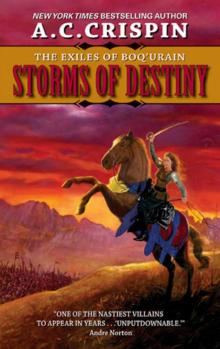 Storms of Destiny
Storms of Destiny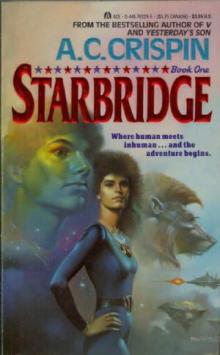 Starbridge
Starbridge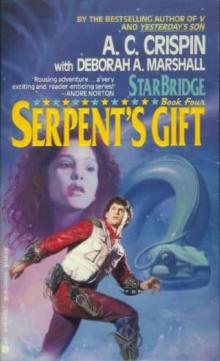 Serpent's Gift
Serpent's Gift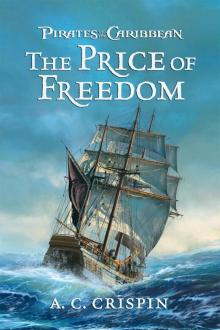 Pirates of the Caribbean: The Price of Freedom
Pirates of the Caribbean: The Price of Freedom V01 - V
V01 - V Silent Dances
Silent Dances V
V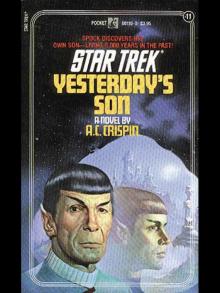 Yesterday's Son
Yesterday's Son Shadow World
Shadow World STAR TREK: TOS #11 - The Yesterday Saga I - Yesterday's Son
STAR TREK: TOS #11 - The Yesterday Saga I - Yesterday's Son Star Wars - Han Solo Trilogy - The Paradise Snare
Star Wars - Han Solo Trilogy - The Paradise Snare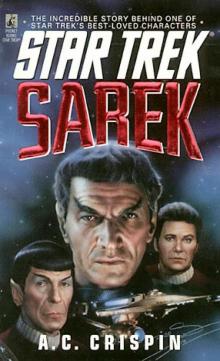 Star Trek - Sarek
Star Trek - Sarek Star Wars: The Han Solo Trilogy I: The Paradise Snare
Star Wars: The Han Solo Trilogy I: The Paradise Snare